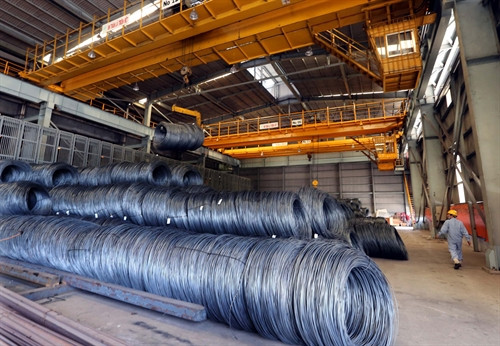 Steel produced at Vina Kyoei Steel Ltd in Ba Ria-Vung Tau province’s Phu My 1 Industrial Zone (Photo: VNA)
Steel produced at Vina Kyoei Steel Ltd in Ba Ria-Vung Tau province’s Phu My 1 Industrial Zone (Photo: VNA)Hanoi (VNA) – While the imposition of additional tariffs on imported steel products as a temporary safeguard against cheap imports since March was meant to protect the local steel industry, consumers and firms that use steel for their production are worried about steel price hikes in the local market.
It’s consumers who must bear the costs rising from the imposition of the safeguard tariffs, said Dam Quang Hung, Deputy Director of Son Ha International Corporation which produces stainless steel products.
Hung said that the imposition of safeguard tariffs would result in higher steel raw material prices and higher prices of products to end-users, and may even cause a monopoly in the domestic steel market.
He urged the management agency to closely watch steel prices by local producers to prevent a monopoly while balancing the benefits between local steel producers and firms that use steel as a raw material.
According to Pham Quoc Vu, Deputy General Director of stainless steel producer Dai Duong International Joint Stock Company, the current safeguard duties on imported steel products were high, which would seriously affect firms which use steel as a raw material.
Under the Ministry of Industry and Trade’s Decision No 862/QD-BTC which came into effect on March 22, temporary safeguard duties of 23.3 percent is applied on steel billet and 14.2 percent on long steel products. The safeguard duties will be applied for a maximum of 200 days, or to October 10.
Vu said that the ministry should apply more appropriate tariffs for imported steel products, or else, producers that use steel as a raw material would encounter difficulties even in the local market.
In the local market, prices of several products made from steel can rise by around 10 percent compared to March due to the imposition of the temporary safeguard tariff, according Tran Anh Tu, a salesman in a building material store in Hanoi.
Nguyen Tuan Vinh, who planned to build a house in Hanoi at the end of this year, is worried that if steel prices went higher, it would considerably push up the construction costs.
Ho Nghia Dung, Chairman of the Vietnam Steel Association, said that the imposition of safeguard tariffs on imported steel products was aimed to protect local steel production.
In trade defence, if benefits of a certain group of firms are protected, others might be affected, Dung said, adding that firms should join with each other to develop a supply chain to deliver mutual benefits.
The ministry’s decision was issued after the investigation found that significant increases in imports of steel billet and long steel products caused serious damage to local production during the 2012-15 period.
Businesses were still importing steel billets and finished steel products, despite the imposition of the temporary safeguard duties, according to the association.
The association’s deputy chairman Nguyen Van Sua said that cheap steel imported from China might continue to flow into Vietnam in the second half of this year as China’s steel industry was faced with a massive overcapacity.
With limited local steel demand, the use of safeguard instruments was essential to protect local producers.
More importantly, local producers must enhance competitiveness in product quality and prices, he said.
The association’s statistics showed that up to 60 percent of imported steel was from China.
Since the beginning of 2016, Vietnam has imported over 9.6 million tonnes of steel of all kinds, worth around 3.42 billion USD, showing a year-on-year rise of 48 percent in quantity and 1 percent in value.-VNA





























